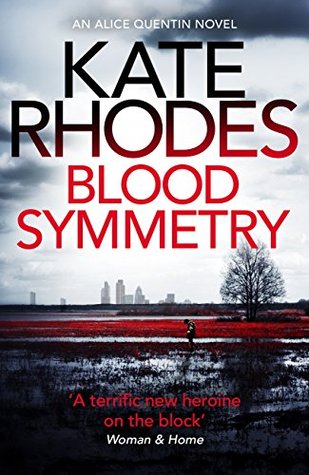
Forensics and psychological profiling are probably my favourite crime fiction elements.
Kate Rhodes uses both effectively to create a fast paced and rather gruesome tale in ‘Blood Symmetry’, her fifth novel in her popular Alice Quentin series.
What’s it about?
Clare Riordan is out running with her son, Mikey, one morning when they are both abducted. Later that afternoon, a medical grade pack of Clare’s blood is found on a London doorstep.
Mikey escapes but, traumatised, is unable to explain what happened, so forensic psychologist Alice Quentin is called in to help Mikey open up and to complete psychological profiling tasks relevant to the ongoing police investigation.
Repeated bloody offerings suggest that Clare is being kept captive, but Alice soon realised that Clare wasn’t the first blood specialist to suffer, and she won’t be the last. Someone is determined to get their revenge for a decades old injustice…
What’s it like?
Genuinely interesting. A decent police procedural with a strong focus on witness interviews, forensic evidence and psychological analysis.
I read the first Alice Quentin book a few years ago, and my response to this one is similar. I really enjoyed reading this, found it thoroughly engaging and stylistically pleasing. The focus on forensics and, in particular, the backdrop of the blood scandal, was consistently interesting. The police characters are convincing and sufficiently delineated, as is the investigative strategy and details.
Typically I get frustrated with crime fiction where the personal / love life of the main investigating characters is a big focus, but Rhodes handles the interplay between the personal and professional so well in these books that I am quite content to read a bit about Alice’s developing relationship with DCI Burns.
Notes on the ending
***** Endings can make or break a book and I do have some feelings about this one I want to discuss. I will not reveal anything I consider would spoil the reading experience, but if you think you would like to read this book without any preconceptions about the ending, then please skip ahead to the final section of this review. *****
My only minor complaint is the ending. As is often the case in crime fiction, the reader knows – and the main investigating character senses – that the rest of the investigative team’s decision to break out the party feeling is premature. ‘But,’ mutters the reader, ‘it can’t be that simple, there’s still 40 pages to go…’
Which is totally fine, but somehow we still end up with a very sudden and therefore slightly unsatisfactory denouement. Having read multiple interviews and been offered multiple suspects, to essentially identify the villain and then close the book a page later leaves the reader gasping, ‘Yes, but – ?!?’
Alice herself notes that, ‘The shrink in me was fascinated to find out…[more] but Burns brought the interview to a close then escorted me from the room’. Rhodes does the same with the book, delivering a firm sense of ending and shutting the door on these characters, but, unlike Alice, we have no way of later revisiting that interview or that character.
To be fair to Rhodes, the basic motives are clearly sketched; I suppose it just feels like the rest of the novel is so chatty, then the end is quite abrupt by comparison. There’s no extended justification from Rhodes’ villains, partly because she seems, in a sense, not to share Alice’s need to know. Alice wants to know the villain’s backstory. Rhodes, possibly more interested in a dramatic conclusion than in the finer nuances of the villain’s psyche, essentially raises her hands and tells the reader, ‘well, they’re clearly mad…or maybe not, but never mind, we’ve got them now’.
Final thoughts
I really enjoyed reading ‘Blood Symmetry’ and it has inspired me to find out more about the tainted blood scandal from the 70s / 80s.
This is a deeply personal matter for Rhodes as her own husband was a victim of the scandal, though one who has survived. Despite this, her storytelling is consistently engaging and focused on human emotions and situations; Rhodes never veers into invective or lengthy catalogues of abuse. The horror of the scandal is a vivid backdrop but never overshadows the pace of the whodunnit.
Obviously, blood is a central preoccupation of this story and a lot of blood is thrown around – literally! – meaning this novel may not suit readers who are deeply squeamish. That said, whilst gruesome in places, the writing is never gory. I am typically quite squeamish and I didn’t have to put the book down or take a break at any point, which I think is a tribute to Rhodes’ deft handling of the violence.
Once again, having finished reading one of Kate Rhodes’ novels, I am left feeling very keen to read her other books. This worked perfectly well as a stand-alone so I don’t think it’s essential to read the books in order, though if Alice sounds like a character you would enjoy spending time with, you may wish to start at the beginning with ‘Crossbones Yard’.
Having seen Rhodes speak at CrimeFest18, I can add that she is also thoughtful, humorous and a great facilitator for discussions. If you get the chance to see her in person I would wholeheartedly advise it.